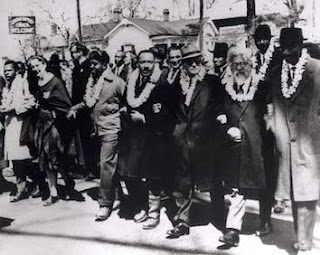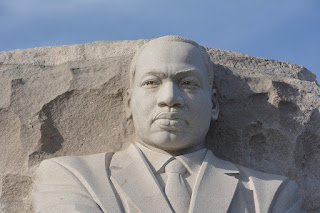Nonviolent Action: Can It Work?
by Joel Stephen Williams
We live in a violent world where human life seems cheap, and the use of violence appears to be increasing. The bloodshed of the past century and the inhumanity of man is shocking. We are now so increasingly capable in our ability to destroy human life with powerful weapons of warfare that most people mock the very idea of nonviolent action. Sider begins his book Nonviolent Action by asking: “What good would it do for three kayaks, three canoes, and a rubber dinghy to paddle into the path of a Pakistani steamship? For a tiny fishing boat with unarmed, praying Americans aboard to sail toward an American battleship threatening Nicaragua? For an eighty-year old woman in a wheelchair to stop in front of advancing Filipino tanks?” Ineffective? Worthless? Delusional efforts of naïve people? Nevertheless, “The tanks stopped, and a nonviolent revolution succeeded. The American battleship left, and the threat of invasion faded. And the US shipment of arms to Pakistan stopped” (xiii).
All of us know of Mahatma Gandhi’s and Martin Luther King Jr.’s success with nonviolent action. Sider contends and gives evidence that there are scores and scores of other instances of nonviolent victories over dictatorships and oppression in the last century. Sider quotes Leonidas Pranao: “There are only two invincible forces in the twentieth century—the atom bomb and nonviolence.” So, in light of the increasing violence, bloodshed, genocide, and destruction in our world today, Sider urges every Christian, whether a pacifist or not, to explore the possibilities of nonviolent action as a way to pursue peace and justice.
Part I is devoted to proving that nonviolent action works. Sider reviews some of the early history of nonviolence, the efforts of Gandhi to bring independence to India, the nonviolent civil rights campaign of Martin Luther King, Jr., the Witness for Peace movement’s influence for good in Nicaragua, and nonviolent revolution in the Philippines. Part II examines the role that nonviolent action played in defeating the Soviet Empire with separate chapters on Cardinal Wojtyla and the Solidarity movement in Poland and on Christian Führer along with other Christians who prayed and protested nonviolently in East Germany.
Part III covers more recent victories for nonviolent action with separate chapters on the women of Liberia helping overthrow the dictator, Charles Taylor, the major role of nonviolence movements in the Arab spring where two countries formerly ruled by dictators held the first free elections in their history, and the creation of numerous new peacemaker teams that have emerged “to expand the use of nonviolent ways to reduce conflict in violent situations” (141). Sider makes no claims for this to be a full history of nonviolent action, of course, but it is sufficient evidence that nonviolent action can and does often work.
Part IV is where Sider calls Christians to action. He declares that the Christian community has never tested the full range of possibilities of nonviolent resistance to injustice and oppression in a sustained, carefully organized, and solidly financed way (157). Neither has any other community. He gives compelling reasons why Christians should explore nonviolent alternatives. He stakes out common ground for pacifists and non-pacifists. The final chapter is the most sobering of all. He reminds us that nonviolent struggle against war will be a long and costly battle. Sider’s work is a clarion call. May it arouse the church out of its lethargy and turn us from false means of reformation.
This review originally appeared in Stone-Campbell Journal 19, no. 2 (Fall 2016). It is reproduced in Christian Ministry and Missions blog with the kind permission of Dr. William R. Baker, editor of Stone-Campbell Journal. Many thanks to Baker Publishing Group for making the following book, which I recommend highly, available for review: Sider, Ronald J. Nonviolent Action: What Christian Ethics Demands But Most Christians Have Never Really Tried. Grand Rapids, MI: Brazos Press, 2015. 208pp. $22.00.
The above image of Dr. Martin Luther King, Jr., and other leaders of the Civil Rights Movement at the third Selma Civil Rights March is used under the Fair Use doctrine of United States copyright law.














